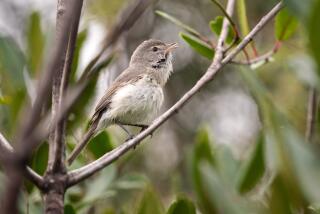Biologists Fear Back Bay Road Repairs Will Bug Endangered Birds
- Share via
As one of the world’s endangered species, the light-footed clapper rail already had enough problems before El Nino.
Winter storms forced the bird--more populous in Newport’s Back Bay than anywhere in the world--to nest farther from shore than usual, closer to Back Bay Road, biologists said.
Normally crowded with bikers, hikers, bird-watchers and sightseers, a large section of Back Bay Road was damaged by the same storms, leading to its closure and a quieter environment for the birds.
But now the city wants to reopen the road, and biologists said they fear the construction commotion will disturb the nests.
“The hard thing with clapper rails is they’re a very endangered species,” said Susan Wynn, a biologist with the U.S. Fish and Wildlife Service. “You have to be a lot more conservative.”
Biologists counted only 105 nesting pairs along the bay this year, compared to about 150 the year before, Wynn said.
Only 300 pairs exist worldwide.
“We realize that without the people there, they might have decided to plunk down a little closer to” Back Bay Road, Newport Beach Public Works Director Don Webb said. “In the past it’s always been open during the nesting season.”
Wynn said the wildlife service would be reluctant to grant a construction permit until the birds are done nesting, as late as Sept. 15. Biologists will watch to determine if the birds finish nesting sooner, thus opening the way for the bulldozers and backhoes.
“We’re going to try to work with” city officials, Wynn said, “to see if they can get in there sooner.”
Storms in December and February caused significant damage to a stretch of the road, from Shellmaker Road into Eastbluff. Crews will have to clear landslides, repair a weakened storm drain and rebuild washed-out pavement.
Webb said the city hopes to have work done “when there’s a little bit of summer left.” Before it was barricaded, hundreds of people every day communed with nature along the route, he said.
The city already sought bids for the work, but the estimates came in too high, Webb said. Next week his department will ask the City Council to reject those and ask for bids on a modified plan, expected to cost about $150,000.
Webb said work would take four to six weeks, and could begin by July 1 if federal officials grant approval.
But Wynn said wildlife officials will make sure the birds aren’t squeezed between road construction hubbub and the noise of Back Bay dredging, which itself was delayed because of storms.
“That darn El Nino,” Wynn said. “It’s just a tough year to be a bird.”
More to Read
Sign up for Essential California
The most important California stories and recommendations in your inbox every morning.
You may occasionally receive promotional content from the Los Angeles Times.













